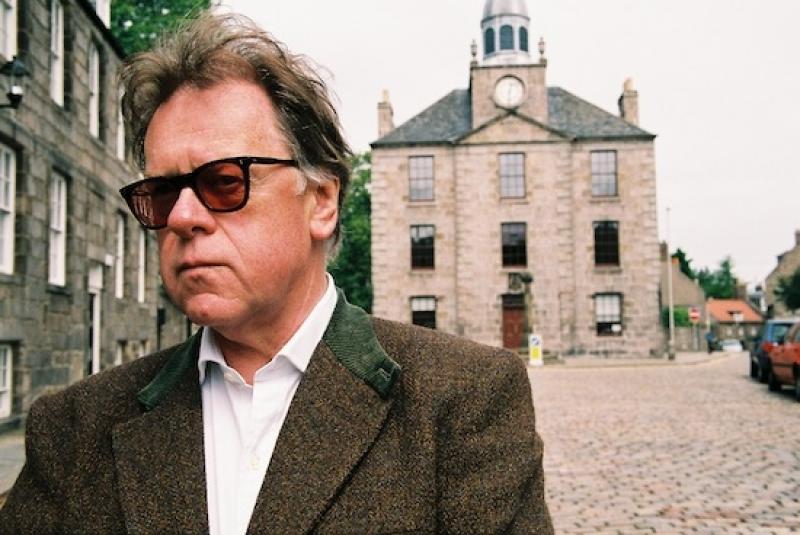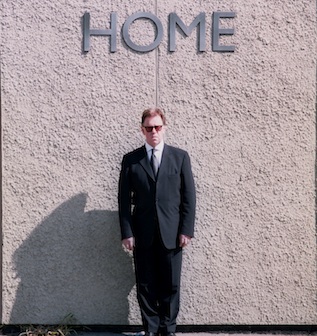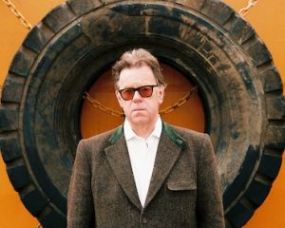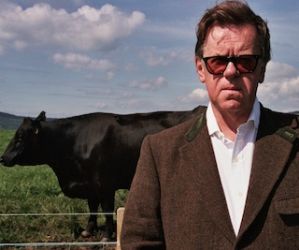Interview: Jonathan Meades, Auteur-at-Large | reviews, news & interviews
Interview: Jonathan Meades, Auteur-at-Large
Interview: Jonathan Meades, Auteur-at-Large
The provocative film-maker, novelist and critic returns with three films about Scotland

In his forbidding dark suit and heavy-framed sunglasses, declaiming his artfully wrought texts to camera with the ominous certainty of a hanging judge, Jonathan Meades is one of TV’s most unmistakable presences. While it may be lamentable that we don’t see him more often, it’s miraculous, in the current climate, that we see him at all.
His films are densely layered brain-twisters where history, architecture and folklore collide, ripe with allusion, metaphor and facts carefully selected for their provocative value. His best-known series include Abroad In Britain, Further Abroad with Jonathan Meades, and a string of “Abroad” sequels. Jerry Building examined the architectural legacy of the Third Reich, while Joe Building travelled east and did the same for Stalinist Russia.
His latest three-part series, Off Kilter, finds the auteur taking a teasingly perverse tour of Scotland, and after an airing on BBC Four late last year it steps up to the lofty plateau of BBC Two on 27 January.
 “I’d tried to do a series about Scotland about 20 years ago, and been rejected,” Meades reveals, down the line from his home near Bordeaux. “I’ve been produced by BBC Scotland for the last eight years, but I only heard about the idea of doing some Scotland programmes in a roundabout way. It was assumed that I wouldn’t be interested, but I said ‘yes I am’. The reasons are, I would have thought, manifest in the films.”
“I’d tried to do a series about Scotland about 20 years ago, and been rejected,” Meades reveals, down the line from his home near Bordeaux. “I’ve been produced by BBC Scotland for the last eight years, but I only heard about the idea of doing some Scotland programmes in a roundabout way. It was assumed that I wouldn’t be interested, but I said ‘yes I am’. The reasons are, I would have thought, manifest in the films.”
Meades selected as his targets Aberdeen, the downtrodden football towns and industrial wreckage of Fife, and Lewis & Harris, the so-called “Isle of Rust” in the Outer Hebrides. Nothing emerges from a Meadesean onslaught looking quite the same as when it went in. Visiting Lewis & Harris, Meades avoids touristic treacliness and zooms in on the island’s “scrap cult” of derelict cars and rusting corrugated iron sheds. In Aberdeen, he contrasts the city’s Presbyterian roots and granite architecture with the ships and teeming machinery of the oil boom, deploying rhetoric that flirts dizzily with incoherence – “what we squat in are the most tangible vestiges of distant cultures, in cities layered like a geological cassata,” he intones, daring you to laugh. In Fife, he finds collapsed industries, chip shops serving deep-fried Mars Bars, and the bedraggled football teams of Cowdenbeath FC and Raith Rovers. And drink, since “Scotland is the only country in the world which is literally synonymous with alcohol.”
Rather a devastating portrait of Fife, isn’t it?
“Is it?” Meades queries, sounding mock-startled. “I’d have thought it was a fairly accurate representation of my sensibility when faced with Fife, or that very partial bit of it – it’s Kirkcaldy and that particular coast. Had I included St Andrews and the fishing villages to the south of St Andrews it would have been a very different programme, but I didn’t want to make that because it would have been making a factual programme. I’m not interested in making factual programmes, I’m interested in making completely biased fictions.”
Rumour has it that the Fife episode triggered a panic attack among BBC executives. Changes were demanded.“They were a bit worried, yeah,” Meades drawls. “I wouldn’t say panic, but I think had I said the same things about Latvia or Sweden they would have been less worried. But it all worked out in the end, didn’t it?”
But would the film have looked different without BBC pressure?
“No, it was just tiny, tiny things that got cut. Substantively it is the film we made, and the cuts were numerous but they were pretty minor. But it’s not worth dwelling on – whatever you do in any medium you’re going to get censored in some way, and I’m kind of inured to it.
Clearly there was nothing in the Fife film – including Meades’ remark that Kirkcaldy & Cowdenbeath’s election of Gordon Brown as its MP was “a spectacular and unique revenge on the rest of Britain” – to compare with some of the material he wanted to include in an earlier piece, 2001’s Surreal Film.
“We had an item where we turned Ian Paisley from a Protestant into a Catholic, and then we had a song, to the tune of Village People’s 'YMCA', which was called 'INLA'. It had lyrics like ‘you can be [IRA hunger striker] Bobby Sands, you can smear shit with your hands’. Anyway this was cut because it was reckoned to be an incitement to terrorism. It’s incredible when you think about it.”
The trick, Meades has discovered, is to swamp the broadcaster’s defences with a deluge of content.
"This kind of thing happens all the time, so I shove in as much as I think I can possibly get away with knowing that 10 per cent will get cut. The rest will stay because they just can’t be bothered at the end of the day - as we say in football – to cut the more minor things. And also they don’t know what the major things to cut are, so it works out in a weird way that you get away with some good stuff. Not that I’m trying to be offensive, but I do go along with Joe Orton and Kingsley Amis in saying that if you’re not offending someone you’re not doing your job.”
But what is Jonathan Meades’ job? “I suppose it’s to make shows, that’s what I do,” he says, in a chin-stroking kind of tone. “And I never see them again after they’re finished. I never watch the stuff. I had a friend who, tragically, was one of the directors of Howards’ Way, if you remember that?”
The everyday saga of boat-building folk on the South Coast? “That’s the one. I went round to his house one afternoon and his wife said, ‘Tristan’s up in his study’, so I went up and he was watching an old episode of Howards’ Way. I thought, ‘God, that is not what I ever want to do’, so I make my stuff and I don’t see it again. I watch them when they go out on telly but after that it’s all over. It’s just a kind of waste of time looking back to what you’ve done.”
 Meades attended RADA in the late Sixties, but has never formally studied film or TV. However, he identified a select cluster of writers and film-makers, many of them from the Nouvelle Vague of French cinema, from whom he has learned and borrowed assiduously.
Meades attended RADA in the late Sixties, but has never formally studied film or TV. However, he identified a select cluster of writers and film-makers, many of them from the Nouvelle Vague of French cinema, from whom he has learned and borrowed assiduously.
“I was fairly obsessed by film, though I’ve never written about it. Chris Petit said this to me the other day, ‘You’ve never written about film’, but it’s almost deliberate that I never have. I’m extremely interested in particular film-makers, Jean-Pierre Melville and Alain Robbe-Grillet most of all, and I use something of them in what I do. The scripts I write are very like the shooting scripts that Robbe-Grillet wrote. If you look at his scripts for L’immortelle or Last Year in Marienbad or L'Eden et après, I just kind of ripped him off. But I added to that a kind of polemic.”
There’s a pause. “It’s not rocket science,” he adds disingenuously. Meades’ own films are distinguished by a particular kind of knowing archness, using unfamiliar camera angles, formally-framed portrait shots that are as close as film comes to still life, surrealistic interludes, and sequences of the author’s bullish frame delivering his narratives from moving vehicles. He likes to work with a small group of directors – Frank Hanly, Tim Niel, Colin Murray – but how much is them and how much is Meades?
“I’m totally involved, and I write very very detailed scripts,” he asserts. “Nothing is left to be improvised. Everything is set down in stone. I write all the words that I’m going to say, I write in all the locations and I write quite a lot of the shots. Having said that, once I’ve written them I will never tell whoever is directing what to do. I leave that to them, but not an awful lot is left to them because it’s very prescriptive as to what has been written and the particular shots. But when you’ve got good directors like Frank or Tom or Colin, they like this because it makes them think. And it’s restrictive, so they have to think within the bounds of a particular discipline. That’s much more creatively inspiring than being told to do whatever you want.”
 Outside TV, Meades has enjoyed a fairly stellar career in journalism, especially during his stint as the formidably opinionated restaurant critic for The Times from 1986-2001. However, his palate has grown weary of the journalistic grind. "Well, I’m writing two books at the moment and the only journalism I do is if someone will offer me a shitload of money. I’m not really interested in doing journalism. I will doubtless get interested in journalism when the money runs out. I did enjoy it at one time, but I don’t any longer.”
Outside TV, Meades has enjoyed a fairly stellar career in journalism, especially during his stint as the formidably opinionated restaurant critic for The Times from 1986-2001. However, his palate has grown weary of the journalistic grind. "Well, I’m writing two books at the moment and the only journalism I do is if someone will offer me a shitload of money. I’m not really interested in doing journalism. I will doubtless get interested in journalism when the money runs out. I did enjoy it at one time, but I don’t any longer.”
Does he never miss the restaurant critic gig?
“God, no. That was 10 years ago, and I did it for 15 years. I wish I’d given it up much earlier. I felt I was writing in bad faith. I don’t think it’s a good idea to write about something you’ve lost interest in. Also you become identified as doing a particular kind of thing, which is to the detriment of whatever else you do.”
The book projects are “a sort of memoir or autobiography, but not really about me, about growing up in Salisbury during the 1950s, which seemed to me to be like the epicentre of where the Cold War was being fought,” and a new novel. When finished, the latter will be his third foray into full-length fiction.
“The longest one took me four years,” he reflects. “I enjoy it. But it’s not that different from writing telly films. I don’t really write in a different mode, I just kind of adjust according to the medium. Basically with everything I write I start with these huge lists, pages long, of notes, ideas and so on, most of which would make no sense to anybody else. My modus operandi is to include all these things in some way or other. I think it’s absolutely imperative to have as much stuff as possible – information, as many facts or factoids or opinions or mad ideas as you can possibly get into anything. Just stuff it full.”
Jonathan Meades: Off Kilter starts on BBC Two on 27 January at 11.20pm (England, Scotland) and 11.50pm (Northern Ireland)
Add comment
The future of Arts Journalism
You can stop theartsdesk.com closing!
We urgently need financing to survive. Our fundraising drive has thus far raised £49,000 but we need to reach £100,000 or we will be forced to close. Please contribute here: https://gofund.me/c3f6033d
And if you can forward this information to anyone who might assist, we’d be grateful.

Subscribe to theartsdesk.com
Thank you for continuing to read our work on theartsdesk.com. For unlimited access to every article in its entirety, including our archive of more than 15,000 pieces, we're asking for £5 per month or £40 per year. We feel it's a very good deal, and hope you do too.
To take a subscription now simply click here.
And if you're looking for that extra gift for a friend or family member, why not treat them to a theartsdesk.com gift subscription?

Comments
...